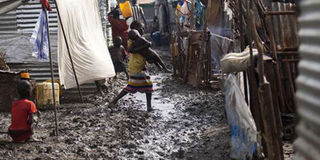The poor are tired of waiting and begging

A child carries her young relative in the Protection of Civilians (PoC) site in Malakal, South Sudan, on June 14, 2016. Today, celebrate soberly and ask what has the church and civil society done to facilitate the poor’s emergence. PHOTO | AFP
What you need to know:
- Pope Francis recognises the rights of the poor to organise themselves into large scale movements.
- Francis is arguing for inclusivity to ensure that the poor are not excluded and do not become the leftovers of a throwaway society.
Today is International Human Rights Day.
All over the country, human rights defenders, activists and communities will celebrate successes while exerting additional pressure on the state to make citizens’ lives more safe, comfortable and equal.
Kenya has made huge advances in terms of democracy, freedoms and human rights, thanks to a robust civil society that withstood Kanu terror in the past and Jubilee opposition today.
But the rot in the police force, the continuous rise in extra-judicial killings and the endemic state corruption are constant reminders of how much remains to be done.
Yet, half a century of advocacy work has mostly concentrated on civil and political rights.
The poor have been very much left to their own devices to gain recognition and dignity.
Title deeds are for the privileged, while 20 million eke out a living as squatters or in informal settlements.
The culture of tunaomba serikali is rampant and institutionalised because it serves the establishment’s interests.
Votes can be bought for a packet of unga; school fees paid for campaign team members.
Housing programmes are designed for the middle class while the poor remain homeless and mostly silenced.
INDULGE THEM
Yet, the next phase of human rights advocacy will almost certainly see the poor mobilise and organise themselves into movements around the three critical issues of land, housing and employment.
Pope Francis recognises the rights of the poor to organise themselves into large scale movements.
Addressing leaders of global movements in Rome he said the poor not only suffer injustice, they also struggle against it.
He went on to say: “One senses that the poor are no longer waiting. You want to be protagonists. You get organised, study, work, issue demands and, above all, practice that very special solidarity that exists among those who suffer, among the poor, and that our civilization seems to have forgotten or would strongly prefer to forget.”
According to the Pontiff “Solidarity is a way of making history”, and this is what the popular movements are doing.
Francis may be dismissed as a communist, but he says movements are immersed in their reality; they know the smell of their neighbourhood, and they have their feet in the mud and are up to their elbows in the flesh and blood of reality.
Above all the poor must be heard: “We want your voices to be heard — voices that are rarely heard. No doubt this is because your voices cause embarrassment; no doubt it is because your cries are bothersome, no doubt because people are afraid of the change that you seek.”
TAKE YOUR PLACE
Francis is the most radical global voice in the planet and church.
He is not advocating for handouts or social welfare solutions.
“The scandal of poverty cannot be addressed by promoting strategies of containment that only tranquilise the poor and render them tame and inoffensive.”
He is arguing for inclusivity to ensure that the poor are not excluded and do not become the leftovers of a throwaway society.
He is demanding that the poor rise up, organise and demand a place at the decision making table.
Today, celebrate soberly and ask what has the church and civil society done to facilitate the poor’s emergence.
[email protected] @GabrielDolan1





